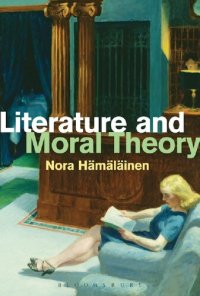
Ebook: Literature and Moral Theory
Author: Nora Hämäläinen
- Year: 2016
- Publisher: Bloomsbury Academic
- Language: English
- pdf
Literature and Moral Theory investigates how literature, in the past 30 years, has been used as a means for transforming the Anglo-American moral philosophical landscape, which until recently was dominated by certain ways of “doing theory”. It illuminates the unity of the overall agenda of the ethics/literature discussion in Anglo-American moral philosophy today, the affinities and differences between the separate strands discernible in the discussion, and the relationship of the ethics/literature discussion to other (complexly overlapping) trends in late-20th century Anglo-American moral philosophy: neo-Aristotelianism, post-Wittgensteinian ethics, particularism and anti-theory. It shows why contemporary philosophers have felt the need for literature, how they have come to use it for their own (philosophically radical) purposes of understanding and argument, and thus how this turn toward literature can be used for the benefit of a moral philosophy which is alive to the varieties of lived morality.
This work investigates the role of narrative literature in late twentieth century and contemporary Anglo-American moral philosophy. It aims to show the trend of reading narrative literature for purposes of moral philosophy as a part of a larger movement in Anglo-American moral philosophy, and to present a view of its significance for moral philosophy overall.
Chapter 1 provides an outline of how narrative literature is considered in contemporary Anglo-American moral philosophy and relates this use to the broad trend of neo-Aristotelian ethics in this context. In Chapter 2 the contemporary use of literature in ethics is connected to the idea of the non-generalizability of moral perception and judgment, which is central to the neo-Aristotelian trend, as well as to a range of moral particularisms and anti-theoretical positions of late twentieth century and contemporary ethics.
The following two Chapters, 3 and 4, move on to a broader understanding of the intellectual potential of narrative literature. It is argued that narrative literature has its own forms of generalization which are enriching for our understanding of the workings of ethical generalizations in philosophy. Chapter 4 is dedicated to Iris Murdoch's and Martha Nussbaum's respective ways of combining ethical generality and particularity in a philosophical framework where both systematic moral theory and narrative literature are taken seriously.
The concluding Chapter 5 returns to the controversy between contemporary anti-theoretical conceptions of ethics and Nussbaum's refutation of these, and presents a suggestion for how the significance of the ethics/literature discussion for moral philosophy can be understood if one wants to overcome the limitations of both Nussbaum's theory-centered, equilibrium-seeking perspective, and the anti-theorists repudiation of theory. This position is called “the inclusive approach.”
This work investigates the role of narrative literature in late twentieth century and contemporary Anglo-American moral philosophy. It aims to show the trend of reading narrative literature for purposes of moral philosophy as a part of a larger movement in Anglo-American moral philosophy, and to present a view of its significance for moral philosophy overall.
Chapter 1 provides an outline of how narrative literature is considered in contemporary Anglo-American moral philosophy and relates this use to the broad trend of neo-Aristotelian ethics in this context. In Chapter 2 the contemporary use of literature in ethics is connected to the idea of the non-generalizability of moral perception and judgment, which is central to the neo-Aristotelian trend, as well as to a range of moral particularisms and anti-theoretical positions of late twentieth century and contemporary ethics.
The following two Chapters, 3 and 4, move on to a broader understanding of the intellectual potential of narrative literature. It is argued that narrative literature has its own forms of generalization which are enriching for our understanding of the workings of ethical generalizations in philosophy. Chapter 4 is dedicated to Iris Murdoch's and Martha Nussbaum's respective ways of combining ethical generality and particularity in a philosophical framework where both systematic moral theory and narrative literature are taken seriously.
The concluding Chapter 5 returns to the controversy between contemporary anti-theoretical conceptions of ethics and Nussbaum's refutation of these, and presents a suggestion for how the significance of the ethics/literature discussion for moral philosophy can be understood if one wants to overcome the limitations of both Nussbaum's theory-centered, equilibrium-seeking perspective, and the anti-theorists repudiation of theory. This position is called “the inclusive approach.”
Download the book Literature and Moral Theory for free or read online
Continue reading on any device:

Last viewed books
Related books
{related-news}
Comments (0)